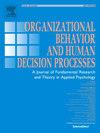性别与社会创业融资:使命漂移视角
IF 3.8
2区 管理学
Q2 MANAGEMENT
Organizational Behavior and Human Decision Processes
Pub Date : 2025-04-26
DOI:10.1016/j.obhdp.2025.104407
引用次数: 0
摘要
越来越多的企业家利用可行的创收商业模式来实现社会福利目标,这种做法被称为社会企业家精神。在本研究中,我们强调了这种混合创业模式引起了投资者对使命漂移(即企业家优先考虑财务收益而牺牲社会使命)的担忧,并研究了这些担忧如何在社会风险融资中造成独特的性别差异。结合使命漂移文献和社会角色理论,我们认为女性企业家被认为具有更强的亲社会动机,更能缓解出资人对使命漂移的担忧。因此,相对于男性同行,她们将为其早期混合社会企业获得更多的财政支持。我们进一步提出,当社会企业家有非营利性工作经验,表明她们致力于社会使命时,这种女性优势可能会减弱。262项社会众筹活动(研究1)的现场档案数据和两个预注册实验(研究2和3)的研究结果为提出的性别对社会创业融资的影响及其潜在机制提供了严格的实证证据。然而,关于非营利性工作经历的调节效应的研究结果仍然没有定论。这项研究揭示了社会企业的混合性质如何重新校准筹资中的评估和性别动态,从而提供了对性别和创业融资的更细致的理解。本文章由计算机程序翻译,如有差异,请以英文原文为准。
Gender and social entrepreneurship fundraising: A mission drift perspective
An increasing number of entrepreneurs are pursuing social welfare goals using viable revenue-generating business models to sustain operations—a practice known as social entrepreneurship. In this research, we highlight that such a hybrid model of entrepreneurship raises funders’ concerns over mission drift (i.e., entrepreneurs prioritizing financial gain at the expense of social missions) and examine how these concerns create a unique gender disparity in social venture fundraising. Integrating the mission drift literature and social role theory, we posit that female entrepreneurs are better positioned to alleviate funders’ concerns over mission drift as they are perceived as having stronger prosocial motivation. As a result, they will garner more financial support for their early-stage hybrid social ventures relative to their male counterparts. We further propose that this female advantage may diminish when social entrepreneurs have nonprofit work experience that signals their commitment to social missions. Findings from archival field data of 262 social crowdfunding campaigns (Study 1) and two preregistered experiments (Studies 2 and 3) provide rigorous empirical evidence for the proposed gender effect on social entrepreneurial fundraising and its underlying mechanisms. However, the findings on the moderating effects of nonprofit work experience across studies remain inconclusive. This research sheds light on how the hybrid nature of social enterprises recalibrates evaluations and gender dynamics in fundraising, thereby providing a more nuanced understanding of gender and entrepreneurial financing.
求助全文
通过发布文献求助,成功后即可免费获取论文全文。
去求助
来源期刊
CiteScore
8.90
自引率
4.30%
发文量
68
期刊介绍:
Organizational Behavior and Human Decision Processes publishes fundamental research in organizational behavior, organizational psychology, and human cognition, judgment, and decision-making. The journal features articles that present original empirical research, theory development, meta-analysis, and methodological advancements relevant to the substantive domains served by the journal. Topics covered by the journal include perception, cognition, judgment, attitudes, emotion, well-being, motivation, choice, and performance. We are interested in articles that investigate these topics as they pertain to individuals, dyads, groups, and other social collectives. For each topic, we place a premium on articles that make fundamental and substantial contributions to understanding psychological processes relevant to human attitudes, cognitions, and behavior in organizations. In order to be considered for publication in OBHDP a manuscript has to include the following: 1.Demonstrate an interesting behavioral/psychological phenomenon 2.Make a significant theoretical and empirical contribution to the existing literature 3.Identify and test the underlying psychological mechanism for the newly discovered behavioral/psychological phenomenon 4.Have practical implications in organizational context

 求助内容:
求助内容: 应助结果提醒方式:
应助结果提醒方式:


